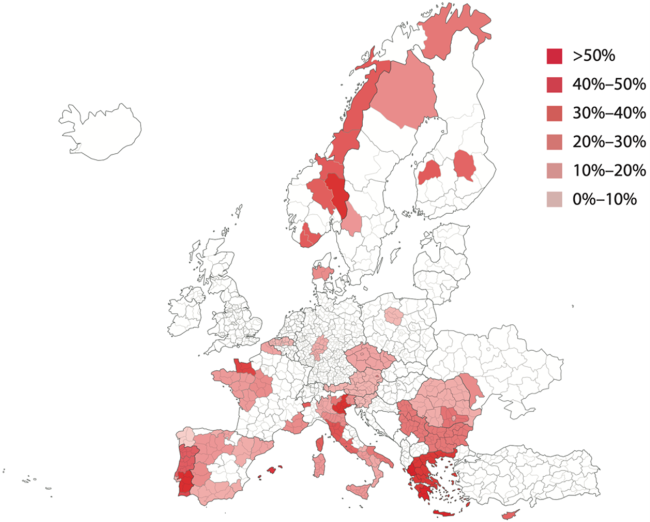
Policy analysis and use of ESIF, IPA and ENP funds with a focus on Smart Specialization Strategies
The Smart Specialisations Strategies (S3) approach is becoming a key instrument for identifying regions’ opportunities for growth, development and circular economy. It is a place-based approach and plays a critical function in benchmarking regional competitiveness and attractiveness. To identify a smart specialisation strategy has been understood as a strategic factor in formulating investment choices and playing a role in circular economy chain and process.
The EU Member States and regions agreed that supporting a limited number of well-identified priorities for knowledge-based investments and/or clusters could promote focusing on competitive assets and realistic growth capabilities, reinforced by a critical mass of action withing circularity and entrepreneurial resources. Agrofood & Bioeconomy (21%), Health & Life Sciences (15%) and ICT & Industry 4.0 are topics that are addressed most by S3 strategies across the EU. Tourism, together with Cultural and Creative industries are addressed by 9% by S3 strategies in the EU. Almost all (84%) of the over 2300 European Regional Development Fund calls for proposals foresee an alignment with the S3 strategies. This clearly identifies the need for Be.CULTOUR pilots to align their Actions Plans or single activities with their national and more importantly regional S3 strategies. Being able to align further action with priority areas, regions will have better chances in using ERDF funding. In case cultural heritage and cultural tourism are not among Be.CULTOUR pilots’ priorities, the integrated approach is needed in defining how to link respective fields with pilots’ S3 in order to be able to attract more ERDF funded projects.
The proposal for the Multiannual Financial Framework (MFF) 2021–2027, regarding the cohesion policy after 2020, the Smart Specialisation approach will continue to be very meaningful in the Cohesion policy implementation. The European Green Deal is entitled to employ a new strain to evaluate the significance of the S3 overseeing the 2021– 2027 MFF. Once again, smart specialisations are understood as a tool to complement innovation funding and support the whole innovation cycle with the aim to bring solutions to the market at the regional level
To understand more about Smart Specialisations, Culture/Cultural Heritage and Cultural Tourism Circularity, Innovation Performance in Be.CULTOUR pilot ecosystems at national and regional levels and more, have a look at Be.CULTOUR work and Deliverable 2.1.
